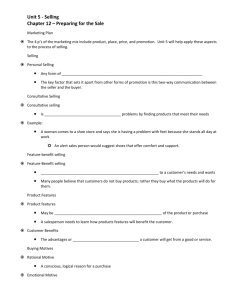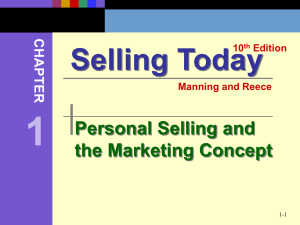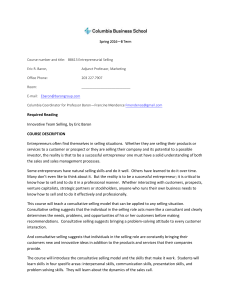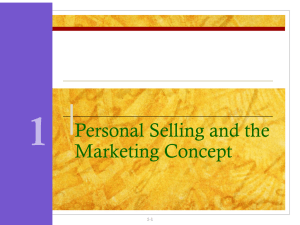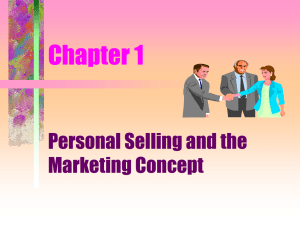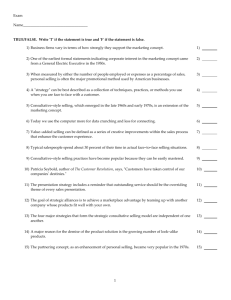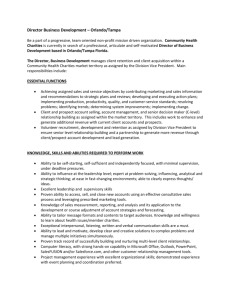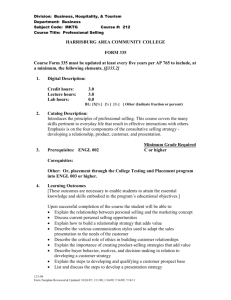Syllabus
advertisement
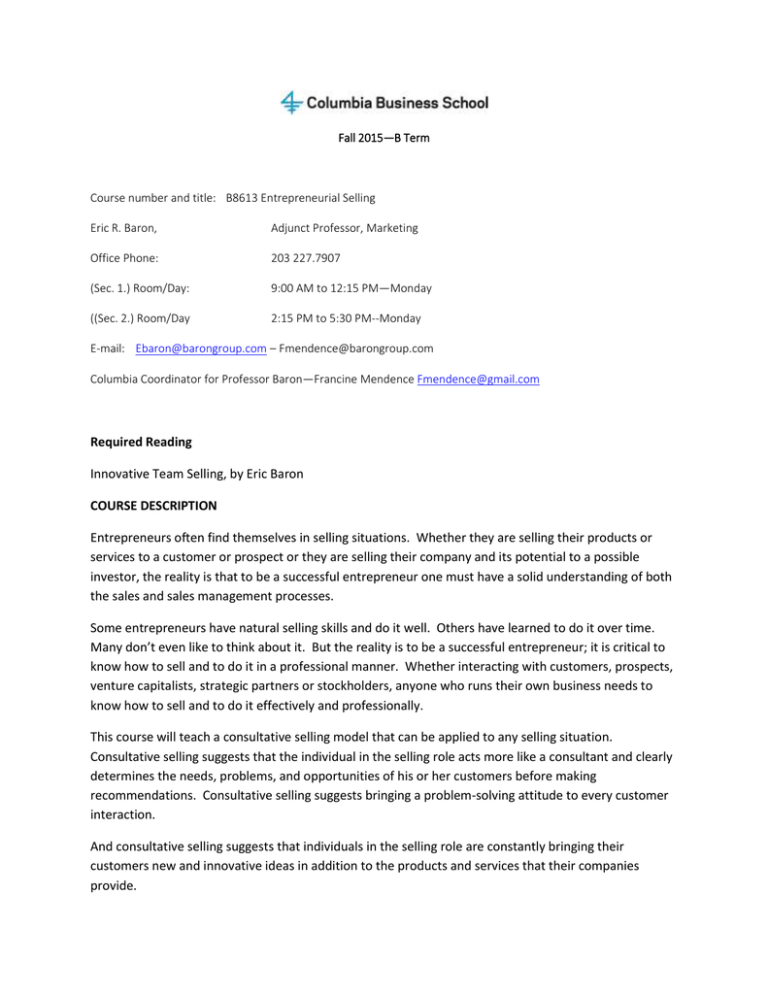
Fall 2015—B Term Course number and title: B8613 Entrepreneurial Selling Eric R. Baron, Adjunct Professor, Marketing Office Phone: 203 227.7907 (Sec. 1.) Room/Day: 9:00 AM to 12:15 PM—Monday ((Sec. 2.) Room/Day 2:15 PM to 5:30 PM--Monday E-mail: Ebaron@barongroup.com – Fmendence@barongroup.com Columbia Coordinator for Professor Baron—Francine Mendence Fmendence@gmail.com Required Reading Innovative Team Selling, by Eric Baron COURSE DESCRIPTION Entrepreneurs often find themselves in selling situations. Whether they are selling their products or services to a customer or prospect or they are selling their company and its potential to a possible investor, the reality is that to be a successful entrepreneur one must have a solid understanding of both the sales and sales management processes. Some entrepreneurs have natural selling skills and do it well. Others have learned to do it over time. Many don’t even like to think about it. But the reality is to be a successful entrepreneur; it is critical to know how to sell and to do it in a professional manner. Whether interacting with customers, prospects, venture capitalists, strategic partners or stockholders, anyone who runs their own business needs to know how to sell and to do it effectively and professionally. This course will teach a consultative selling model that can be applied to any selling situation. Consultative selling suggests that the individual in the selling role acts more like a consultant and clearly determines the needs, problems, and opportunities of his or her customers before making recommendations. Consultative selling suggests bringing a problem-solving attitude to every customer interaction. And consultative selling suggests that individuals in the selling role are constantly bringing their customers new and innovative ideas in addition to the products and services that their companies provide. The course will introduce the consultative selling model and the skills that make it work. Students will learn skills in four specific areas: interpersonal skills, communication skills, presentation skills, and problem solving skills. They will learn about the dynamics of the sales call. They will learn how to build meaningful relationships. They will learn how to plan for their sales calls on a micro and macro level. They will learn how to effectively follow up their sales interactions. In addition, students will be introduced to concepts like team selling, making effective joint calls, prospecting, getting appointments on the telephone and leaving effective voice mail and e-mail messages. And they will be introduced to new ways to best utilize their resources. The course prepares anyone who will build or run his or her own business for what they need to know to be effective in the selling role. The skills that are introduced are state of the art and are based on twenty-five years of research by The Baron Group and highlight the best practices found in the most successful sales oriented corporations throughout the world. Teaching methodology will consist of mini-lecture, group discussions, skill drills written exercises, practice exercises and role-play simulations. Each student will have the opportunity to practice the concepts and skills that are introduced in practice exercises that represent typical selling situations that entrepreneurs and their employees encounter on a regular basis. Guest speakers from different industries will participate in most of the classes. COURSE OBJECTIVES At the conclusion of the course, students will be able to: Understand the connections and similarities between problem solving and selling in order to transform sales calls into problem solving opportunities; Build meaningful relationships with customers, clients, prospects and other key players in the development of the business; Use state of the art skills associated with needs determination including questioning, listening, interpreting, reframing, and understanding non- verbals; Make effective presentations to customers, financial backers and other people involved in contributing to the business; Generate and offer innovative ideas to customers that add value to the relationship; Resolve objections using a straight forward, client centered, problem- solving approach; Gain commitment from customers, prospects and other key players; Plan and follow-up their sales interactions in a professional manner. ASSIGNMENTS Session 1 Introduction to the Course Overview of Problem Solving Comparing Problem Solving and Selling The Consultative Selling Approach The sales process is a problem solving process. The highest level of selling occurs when salespeople transform sales calls into problem solving opportunities. This class will introduce proven problem solving skills and techniques and will demonstrate the similarities between problem solving skills and selling skills. A practice exercise in which students will work on a specific problem will be used as a way to introduce the concepts. The class will conclude with the introduction of the consultative selling model. Readings/Assignments: Voss (article): “What’s the Big Idea” Baron (white paper): Problem Solving Selling Session 2 The Consultative Selling Model An In-depth Investigation Building Relationships Positioning Sales Calls Effectively This class will begin the process of dissecting the consultative selling approach. The needs driven approach to selling will be introduced to demonstrate how consultative selling has evolved. The first phase of the consultative selling model, Positioning the Meeting will be reviewed in detail. Students will discuss how to put customers at ease, how to establish agendas and how to set the stage for questioning. They will learn why Buyers buy and how to deal with the critical issue of trust. The concept of salesperson as facilitator will be reviewed and students will learn how to effectively manage multiple person sales calls. The first practice session will be conducted which asks students to practice the first phase of the consultative selling model—Positioning the Meeting. The session will end with a brief discussion about differences between needs and solutions. Readings/Assignments: There are no assignments or suggested articles for reading this week Session 3 Overview of Situation Analysis Questioning and Listening—The Critical Skills Understanding Buyers’ Needs The Pitfalls Associated with Needs Development This class will investigate what most people believe is the most important and most challenging part of the consultative—Situation Analysis. Understanding the customer’s needs, problems, opportunities, and issues is the key to consultative selling. The skills required to be effective at determining needs—questioning, drawing out, listening, interpreting, reframing, paraphrasing and understanding non-verbals will be investigated in detail. Students will learn why Buyers’ buy and will explore the different kinds of needs they have as well as the ways they express those needs. The key issue of understanding the difference between a need and a solution will also be addressed in detail. The second practice session will be conducted which asks students to practice the skills associated with the second phase of the consultative selling model— Analyzing the Situation. Readings/Assignments: Baron: The Real Selling Starts After You Get the Order Allesandra: Non-Manipulative Selling (optional) Session 4 Overview of Offering Recommendations Making Effective Sales Presentations Selling Ideas—The Hardest Sale of All Presenting to Large Groups This class will focus on the part of the process that salespeople enjoy the most— Offering Recommendations. This is where they are most comfortable as they are talking about what they know best. And of course this is when they get to do most of the talking which is something most people in the selling role enjoy. For entrepreneurs this is exacerbated since they feel so strongly about their companies as well as their products and services. Knowing how to make effective sales presentations is critical for anyone who wants to be successful as an entrepreneur. Students will learn how to present their products and services in a variety of situations ranging from one-on-one sales calls to formal presentations. Also included in this class will be insights as to how to differentiate oneself by offering unsolicited ideas to customers that help them improve their business. Students will learn how to make recommendations based on the needs of their customers and will see that the key to an effective sales presentation is to demonstrate their ability to relate what they have to offer to what the customers agree is important to them. The third practice session will be conducted which asks students to practice the third phase of the consultative selling model—Offering Recommendations. Readings/Assignments: Baron: Why Banks Cross Selling Falls Short Allesandra: Non-Manipulative Selling (optional) Session 5 Overview of Resolving Issues and Objections The Art of Reframing The Four Levels of Idea Response Overview of Seeking Closure BIG “C” vs. little “c” Developing Action Plans In this class students will learn what is for most people in the selling role the most challenging part of the process—Resolving the Issues. Managing resistance and learning how to deal with the rejection of one’s recommendations is something that anyone in the selling role must understand. This is particularly important for people who consider themselves entrepreneurs. Students will learn a proven five-step model for objection resolution that can be applied to any conflict situation; whether it is internal or external. They will learn how to apply problem-solving skills to the issue resolution process. They will learn how to transform objections to needs and will see how involving the customer is the key to objection and issue resolution. The objection resolution process enables people to use the resources available to them in unique ways. With this in mind, new concepts associated with team selling will be introduced at this time. Students will learn a direct and non-manipulative approach to closing. They will also be introduced to the types of approaches commonly used in American industry that are inconsistent with the consultative selling approach. Also introduced will be the difference between closing a deal (big “C”) and getting the next steps towards closure (little “c”.) The importance of asking for the business and knowing how to return to managing conflict when necessary will be discussed at length. Every meeting with a customer or potential customer must end with the development of an action plan and this will be discussed at length. Students will participate in a variety of interactive exercises to truly learn how to close deals upon the completion of managing resistance and resolving issues. The fourth practice session will be conducted which asks students to practice the fourth and fifth phases of the consultative selling model—Resolving the Issues and Seeking Closure. Readings/Assignments: Allesandra: Non Manipulative Selling (optional) Baron/Reilly: Teaching Salespeople the Five “W’s” and the “H” of Sales Call Planning Baron/Reilly: Passing the Selling Baton Baron: Sales Rep is Boss When the Manager Tags Along Baron: Joint Sales Calls: The Often Unrealized Opportunity Session 6 Introduction to Pre-Call Planning and Follow-up Making Effective Joint Sales Calls Letter Writing as a Sales Tool Overview of Sales Action Planning Introduction to Prospecting Take Home Final (deadline TBD) Many people believe that what happens before and after the sales call is the key to success. Face to face interactions are certainly important, but what differentiates the good from the very good and the very good from the excellent is what happens before and after the meeting with the customer. With this in mind students will learn a very specific pre-call planning model that applies to the micro planning for sales calls. They will also be introduced to a sales action planning model that addresses the macro planning aspect of the sales process. This class will also spend considerable time talking to the subjects of joint sales calls, team selling, prospecting, and back home applications. Time will be devoted to reviewing the entire course and explaining in detail the final exam, which will be distributed at the conclusion of the class. Students will have the opportunity to discuss the exam with other students for about a half hour. However, once they leave the class they must work alone. NO extensions. Homework Exercises Homework exercises will reflect the kind of pre-call planning and strategizing that salespeople experience in their day-to-day activities. At the conclusion of several classes, students will be given a relatively short assignment that represents a selling situation. They will be asked to review the situation and come to the next class prepared to discuss how they would approach the customer in the scenario. In some cases they will be asked to do this in teams so they can learn the benefits associated with team selling. Final Examination The final examination will be a take home, open book, case examination. The case will consist of a specific, realistic sales opportunity. It will simulate an initial visit to a very high potential customer. Students will be asked to state their objectives, explain what is involved in the pre-call planning, and how they would approach and position the call. They will be encouraged to highlight the kinds of questions they would ask and what the needs are that they would try to uncover or confirm. They will also be asked to determine who would join them from their company on the visit. They will also be asked to explore the presentation that they could be asked to give. Again they will have to explain how they would prepare for such a presentation, how they would position it, how they would tell their story, how they would manage resistance, and how they would attempt to gain commitment. The case will be provocative and quite consistent with what happens in the business world every day. The student will have the opportunity to demonstrate what he or she learned during the program. The exam grade will represent 60% of the grade for the course. Pre-Term Assignment Each student will be asked to come to the first class with four to five specific learning objectives for the course. They will also be prepared to explain why they have selected this program and what selling experience, if any, they have had in the past. There is no pre-reading required for this program. Attending the first class is critically important, since this is the only time that formal problem solving skills are taught and they are referred to throughout the course. METHOD OF EVALUATION SAMPLE: 15% 15% 70% Mid-term Classroom Participation and Attendance Final Exam CLASSROOM NORMS AND EXPECTATIONS Participation in the classroom is mandatory. Success in selling requires proactive behavior and students will be encouraged to actively participate in the skill drills and exercises that are introduced. Attendance is very important, as much of the relevant information that is introduced will be examined in detail only in the classroom environment. Classes will start and end on time, and students are encouraged to be punctual. The prep-work that is required needs to be done. If the reading or preparation is not done adequately it will clearly impact the skill acquisition that the course provides. If students have to miss a class for specific reasons like family related issues or interviews, they must notify the professor before the class.

